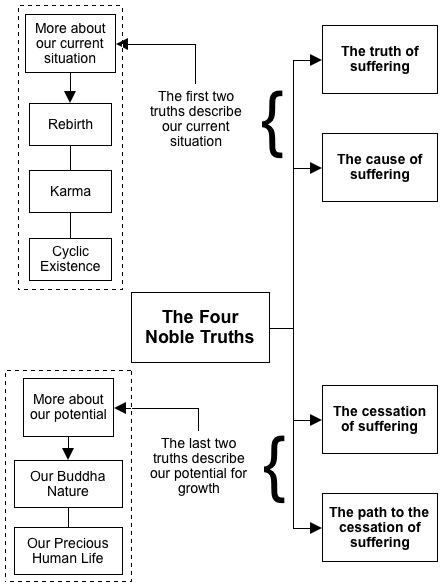Notes
What Karma Is—and Isn't
Karma ("action") refers to the intentional actions of our body, speech, & mind (and their ethical dimensions).
- These actions leave imprints & tendencies on our mindstream.
- When these meet with proper conditions, they affect what we experience.
- What we do creates the cause for what we'll become, and what we are now has come about as a result of previously created causes.
- Buddhism considers cause & effect over a series of lifetimes.
Karma is NOT a system of punishment & reward.
- It's a system of dependent arising.
- When a flower grows from a seed, it's just a result, not a reward or punishment.
- We may think it's not fair to experience in this life the result of what we did in previous lives. But it's not an issue of fair & unfair; it's just the way things naturally function.
- We are responsible for our own experience; we create our future by how we live in the present.
Karma is NOT fate or predetermination; karma is NOT rigid or fixed.
- If we're mindful & aware of our actions, we can create our future.
- We are able to influence to some extent how an imprint matures.
- Many factors affect the type of result an action brings: the action itself, who it's done to, motivation, frequency of the action, whether it's purified later, etc.
- Don't use the law of karma as an excuse to avoid helping others (e.g., "don't interfere with their karma") or to look down on others ("they deserve what they get").
Characteristics of Cause and Effect
There are four principal characteristics of cause & effect:
- Karma is definite.
- Constructive actions bring happy results.
- Destructive actions bring undesirable results.
- When we experience misfortune:
- Don't compound our suffering through emotional upset & self-pity.
- Accept that we made mistakes in the past & develop a firm intention to avoid creating the causes of suffering in the future.
- Karma is expandable.
- A small cause can bring a large result.
- Don't rationalize small harms, don't dismiss small goods.
- If the cause for a certain occurrence isn't created, that occurrence won't be experienced.
- Things happen because we've created the cause.
- Knowing this gives us enthusiasm to avoid harming & to act constructively.
- The imprints our actions make on our mindstreams don't get lost.
- Imprints will eventually ripen when the proper conditions are assembled, unless a negative imprint is purified or a positive one is impeded by anger or wrong views.
- Some actions are destructive by nature, including the ten non-virtues: killing, stealing, unwise sexual behavior, lying, divisive speech, harsh speech, idle talk, coveting, malicious thought, & wrong views.
- A general guideline for which actions to abandon & which to cultivate can be determined according to the motivation.
- Actions motivated by the disturbing emotions (attachment, anger, closed-mindedness, jealousy, pride) are negative actions.
- Actions motivated by detachment, patience, compassion, wisdom, etc. are constructive.
We don't necessarily experience the results of our actions immediately. Be satisfied to create positive causes and know they'll ripen in the future.
Actions and Purifications of Actions
A complete action (which consists of the motivation, the action itself, and the completion of the action) influences four aspects of our experience:
- The body we're born into in future lives
- What happens to us while we're alive
- Our personality characteristics (traits, habits, etc.)
- The environment we live in
We can purify our negative actions so they won't bring painful results (or we can at least weaken their effects).
The four opponent powers are used to purify negative imprints (preventing future suffering and relieving guilt & heavy feelings):
- Regret
- Be sincere.
- Avoid self-recrimination & guilt.
- Reliance
- Take refuge in and rely on Buddha, Dharma, Sangha.
- Generate altruism & bodhicitta.
- Performance of an actual remedial practice
- Complete any constructive action that benefits others.
- Listen to teachings, making offerings, etc.
- Meditate on emptiness.
- Firm determination not to do the action again

